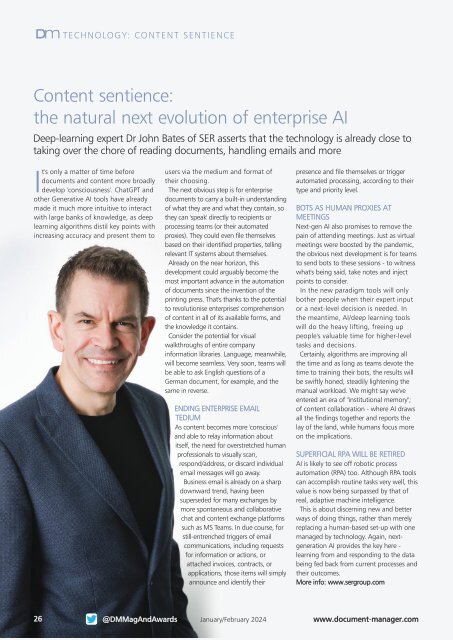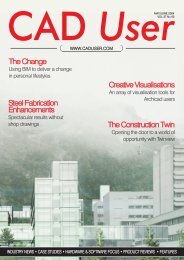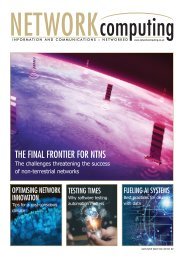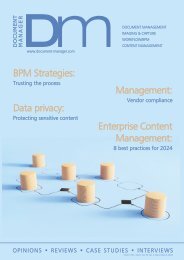DM Jan-Feb 2024
You also want an ePaper? Increase the reach of your titles
YUMPU automatically turns print PDFs into web optimized ePapers that Google loves.
Dm TECHNOLOGY: CONTENT SENTIENCE<br />
Content sentience:<br />
the natural next evolution of enterprise AI<br />
Deep-learning expert Dr John Bates of SER asserts that the technology is already close to<br />
taking over the chore of reading documents, handling emails and more<br />
It's only a matter of time before<br />
documents and content more broadly<br />
develop 'consciousness'. ChatGPT and<br />
other Generative AI tools have already<br />
made it much more intuitive to interact<br />
with large banks of knowledge, as deep<br />
learning algorithms distil key points with<br />
increasing accuracy and present them to<br />
users via the medium and format of<br />
their choosing.<br />
The next obvious step is for enterprise<br />
documents to carry a built-in understanding<br />
of what they are and what they contain, so<br />
they can 'speak' directly to recipients or<br />
processing teams (or their automated<br />
proxies). They could even file themselves<br />
based on their identified properties, telling<br />
relevant IT systems about themselves.<br />
Already on the near horizon, this<br />
development could arguably become the<br />
most important advance in the automation<br />
of documents since the invention of the<br />
printing press. That's thanks to the potential<br />
to revolutionise enterprises' comprehension<br />
of content in all of its available forms, and<br />
the knowledge it contains.<br />
Consider the potential for visual<br />
walkthroughs of entire company<br />
information libraries. Language, meanwhile,<br />
will become seamless. Very soon, teams will<br />
be able to ask English questions of a<br />
German document, for example, and the<br />
same in reverse.<br />
ENDING ENTERPRISE EMAIL<br />
TEDIUM<br />
As content becomes more 'conscious'<br />
and able to relay information about<br />
itself, the need for overstretched human<br />
professionals to visually scan,<br />
respond/address, or discard individual<br />
email messages will go away.<br />
Business email is already on a sharp<br />
downward trend, having been<br />
superseded for many exchanges by<br />
more spontaneous and collaborative<br />
chat and content exchange platforms<br />
such as MS Teams. In due course, for<br />
still-entrenched triggers of email<br />
communications, including requests<br />
for information or actions, or<br />
attached invoices, contracts, or<br />
applications, those items will simply<br />
announce and identify their<br />
presence and file themselves or trigger<br />
automated processing, according to their<br />
type and priority level.<br />
BOTS AS HUMAN PROXIES AT<br />
MEETINGS<br />
Next-gen AI also promises to remove the<br />
pain of attending meetings. Just as virtual<br />
meetings were boosted by the pandemic,<br />
the obvious next development is for teams<br />
to send bots to these sessions - to witness<br />
what's being said, take notes and inject<br />
points to consider.<br />
In the new paradigm tools will only<br />
bother people when their expert input<br />
or a next-level decision is needed. In<br />
the meantime, AI/deep learning tools<br />
will do the heavy lifting, freeing up<br />
people's valuable time for higher-level<br />
tasks and decisions.<br />
Certainly, algorithms are improving all<br />
the time and as long as teams devote the<br />
time to training their bots, the results will<br />
be swiftly honed, steadily lightening the<br />
manual workload. We might say we've<br />
entered an era of "institutional memory";<br />
of content collaboration - where AI draws<br />
all the findings together and reports the<br />
lay of the land, while humans focus more<br />
on the implications.<br />
SUPERFICIAL RPA WILL BE RETIRED<br />
AI is likely to see off robotic process<br />
automation (RPA) too. Although RPA tools<br />
can accomplish routine tasks very well, this<br />
value is now being surpassed by that of<br />
real, adaptive machine intelligence.<br />
This is about discerning new and better<br />
ways of doing things, rather than merely<br />
replacing a human-based set-up with one<br />
managed by technology. Again, nextgeneration<br />
AI provides the key here -<br />
learning from and responding to the data<br />
being fed back from current processes and<br />
their outcomes.<br />
More info: www.sergroup.com<br />
26 @<strong>DM</strong>MagAndAwards <strong>Jan</strong>uary/<strong>Feb</strong>ruary <strong>2024</strong> www.document-manager.com
















